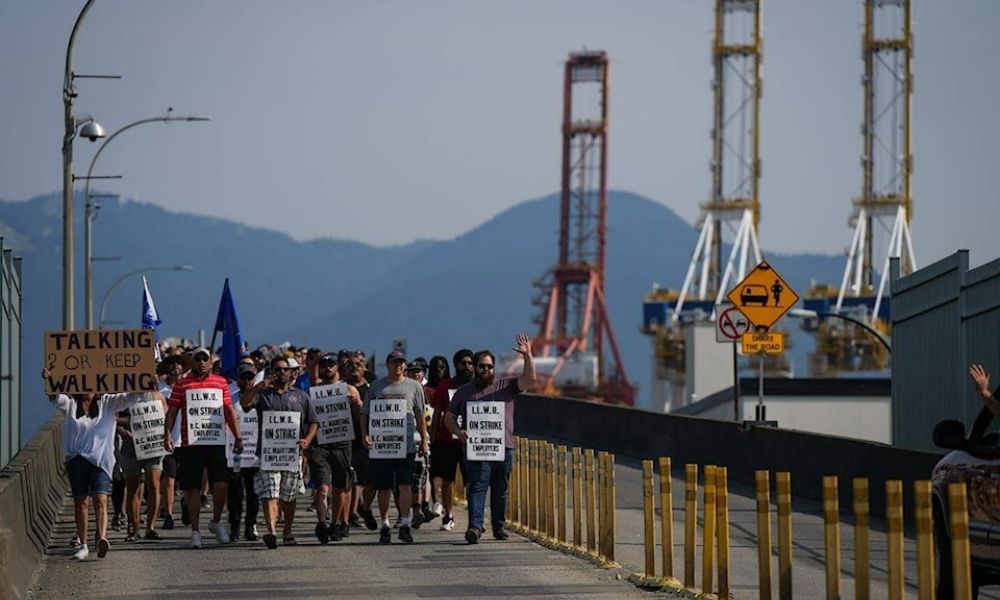
Almost 75% of British Columbia port workers voted in favor of their most recent contract offer.
On Saturday (Aug. 5), business organizations continued to call on the federal government to act in the aftermath of the recently concluded British Columbia port workers strike, stating that Ottawa must ensure such a disruption never happens again.
However, labor experts say the federal government is treading a fine line between business demands and upholding workers' constitutional rights.
"On the one hand, they clearly do not want to offend the very powerful business community." On the other hand, they don't want to offend the labor groups they've been courting for years," said Larry Savage, a professor in Brock University's labor studies department.
| Are you a Tax Lawyer in USA? 👉Transform Your Brand: Click for Metamorphosis👈 |
The union representing around 7,400 British Columbia port workers announced Friday that members voted over 75% in favor of their latest contract offer, bringing an end to five weeks of turmoil that halted the shipment of billions of dollars' worth of products. This featured a 13-day strike that began on Canada Day and affected over 30 British Columbia port terminals and other connected sites.
Following the announcement of the ratification vote results, federal Labour Minister Seamus O'Regan released a statement urging federal officials to evaluate the entire matter in order to avoid a port interruption of this size in the future.
"This dispute caused significant disruption to our supply chains, putting our strong international reputation as a trustworthy trading partner at risk." "We don't want to be back here," said O'Regan, adding, "We'll have more to say about this soon."
On Saturday, representatives from O'Regan's office had no more comment.
For weeks, the Liberal administration has been under strong pressure to resolve the port conflict, according to Savage.
During the dispute, business groups and some political leaders called for back-to-work legislation, and now that it has ended, the Canadian Federation of Independent Business is urging the federal government to designate ports as an essential service and abandon its promise to ban replacement workers.
Small businesses have paid a high price as a result of the strike and the uncertainty it has created, according to Federation President Dan Kelly in a statement issued on Saturday.
"While the work stoppage is over, it will take weeks to address the backlog, and as a result, the financial consequences for small businesses across Canada will be difficult for months to come."
Kelly stated that the incident demonstrates the urgent need to reconsider Canadian labor regulations so that the broader economy and Canada's worldwide reputation are taken into account when strikes and lockouts occur in vital areas.
The Canadian Chamber of Commerce weighed in as well, with Vice-President Robin Guy issuing a statement stating Ottawa should "consider providing new tools that can be used in the face of labor disputes in sectors critical to Canada's supply chain."
The measures advocated by business groups, if implemented, would reduce employees' rights and bargaining strength while sweeping crucial issues under the rug, according to Barry Eidlin, an associate professor of sociology at McGill University who specializes in labor movements and labor policy.
Some, though, would be tough to implement, he added. When it comes to labor action, including strikes, workers have constitutional rights.
Throughout the B.C. ports conflict, Eidlin was impressed by what he saw as an ongoing pattern in Canadian labor relations in which calls for back-to-work legislation are proposed as a default solution in some quarters.
"That is just a very destructive dynamic for having healthy industrial relations," he explained. "It basically short-circuits the collective bargaining process and puts the thumb on the scales for the employer side, which then reduces their incentive to actually bargain."
This is a "minefield" for the Liberal government, according to Savage.
"If they do what the business community wants, they will not only alienate organized labor, but they may also violate the Charter of Rights," he stated.
According to Savage, the Liberals and the NDP have promised anti-scab legislation as part of their supply-and-confidence deal, which the labor movement has been seeking for more than two decades.
While no details of the four-year agreement covering British Columbia port workers have been released, the employers organization stated in a statement that it "includes increases in wages, benefits, and training that recognizes the skills and efforts of B.C.'s waterfront workforce."
After the union and the employers revealed a tentative agreement late Sunday night, union members voted over a two-day period.
The ratification comes after the union rejected a mediated settlement twice in July, once through the leadership caucus and again through a vote of the entire membership.
| Are you a Tax Lawyer in USA? 👉Transform Your Brand: Click for Metamorphosis👈 |
The revised agreement was reached with the assistance of a mediator from the Canada Industrial Relations Board, who cautioned union local presidents that changing their position and refusing to endorse the agreement after first accepting might be considered unfair labor practice.
The last, rejected four-year agreement contained a salary hike that would have raised the median compensation for a union longshore worker from $136,000 to $162,000 annually, according to the employers.
It also includes a signing incentive of around $3,000 per full-time employee. It's unclear whether those revisions were incorporated into the most recent contract.
The parties had been talking since February, with the last agreement set to expire at the end of March. The primary sources of disagreement had been job protection from automation and the outsourcing of maintenance tasks to third parties. (Saanich News)